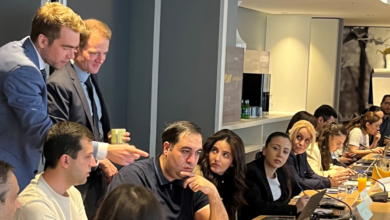
Formation of favorable investment climate and financial market infrastructure in Armenia were discussed at the first investment and financial forum, “Armenian Capital Markets: Future Outlook.” The event organized by Freedom Broker Armenia in cooperation with the Ministry of Economy brought together representatives from all branches of the financial sector.
in his opening remarks Timur Turlov, the founder and head of Freedom Holding Corp, emphasized the significance of developing the capital market in Armenia. He believes that developing the capital market can bring vast opportunities to the country, such as introducing new technologies, attracting investors and building closer integration with the European Union, the United States, Central Asian countries, and the rest of the world. And the issue of trust in the financial system is critical here.
“The population’s welfare increases with a higher level of trust in the financial system. Tax collection improves with more public companies, and the economy becomes more active with more private investors. As a large enough investor, we are interested in discussing the current opportunities for capital markets and how we can actively pursue them. Freedom Holding Corp. already has a capital of over a billion dollars. We have many talented employees in Armenia who will be happy to contribute to developing culture, financial literacy, and technology to achieve a more sustainable system and make long-term investments in our development,” said Timur Turlov.
The forum’s centerpiece was the plenary session devoted to Armenia’s investment climate and the prospects of capital market development. Deputy Minister of Economy Narek Teryan said the sphere is still underdeveloped in the country. Companies attract money by classical methods, such as loans from banks or through partners.
He said that the government and the state must create incentives and conditions for developing capital markets to remedy the situation. Building investor confidence is also important. This is one of the critical factors for attracting financing.
“Trust will help increase market transparency, make information about products, terms, and issuers available, and build long-term customer relationships. As a government, we plan to introduce such tools as providing possible guarantees from the state and development institutions, support programs for entering the market of shares or companies that operate in industries and projects promising for the country. We are already implementing some of this. But for balanced development, it is important to ensure that such measures are cross-cutting. We must develop the capital market and gradually shift the focus away from classical fundraising. On top of that, we need to educate the public to explain why it’s safe. But we are only at the beginning of our journey,” Narek Teryan noted.
Samvel Khanvelyan, Head of the Public Debt Management Department of the Ministry of Finance, stressed that historically, government bonds have been the locomotive in the capital market. The international bank’s assessment results show that Armenia’s domestic debt market is more developed regarding infrastructure, but there is still room for growth in the secondary market.
“But we see a positive trend. While banks were the main recipients of bonds in 2020, this figure has now fallen by 26%, meaning that the participation of other participants has increased. The retail system in Armenia was introduced in 1997 but has been developing since 2017, when we introduced an online platform. It’s certainly a bit inferior to the regular government bond system in terms of volume, but even here, we’re noticing an increase in participation. Starting in March, we will use an improved online trading system. This will enable both residents and non-residents to purchase national securities,” he said.
According to Garegin Gevorgyan, Director of the Financial System Stability Directorate at the Central Bank of Armenia, banks have historically dominated the country’s financial system. They will remain so in the near future.
“Naturally, changes are necessary for the active development of the capital market. However, we currently present it as a pyramid with trade and open markets as its pyramids. We need to start from the foundation to build a strong institutional system—much to be done in this regard, such as forming a market for the Armenian Dram. The Armenian economy lacks the necessary tools to determine its short-term price, which we consider the main issue. All future actions to develop the capital markets will be based on addressing this problem,” Garegin Gevorgyan said.
Hayk Yeganyan, CEO of AMX and chairman of the Management Board, took the floor next. He is confident that for a long time, the market didn’t develop much because it simply lacked the tools, the full chain. At the same time, the republic already has a generally good legislative framework, infrastructure, and a stock exchange with a new collateral program that gives access to final investors through the platform.
“We have a large base of potential investors. This is $10 billion, mainly stored in deposits or square meters. There is a liquid base for investments and good potential issuers. There are already many of them, including those that have received credit ratings. But there are no investment bankers or miners. There is not enough secondary market due to the lack of broker-dealers. If you fill this void, the one who takes up this case first will get a good head start and a business case. According to our calculations, it is possible to underwrite from $500 million to $1 billion annually,” the speaker shared.
Hayk Yeganyan is sure that, at the same time, it is vital to educate the population. For example, he mentioned the work done by Freedom Holding Corp in Kazakhstan, where people started investing in bonds, foreign assets, and the corporate sector.
Timur Turlov continued the topic. He confirmed that if retail investors understand that they can save on taxes and get a higher return on their savings, they come to the market. They do it especially actively when these products appear in the banking app, and buying securities becomes as simple as opening a bank deposit.
“If we want to see hundreds of thousands of people, hundreds of thousands of residents of Armenia buying securities, we need to do it as simply as banks do. Moreover, full-fledged investment banks should appear to provide people with these banking operations. Attracting retail is not so difficult when you have such players and digital platforms. Companies enter this market when they realize that they can effectively raise capital. And the state benefits from this in the form of taxes and economic growth,” he concluded.








